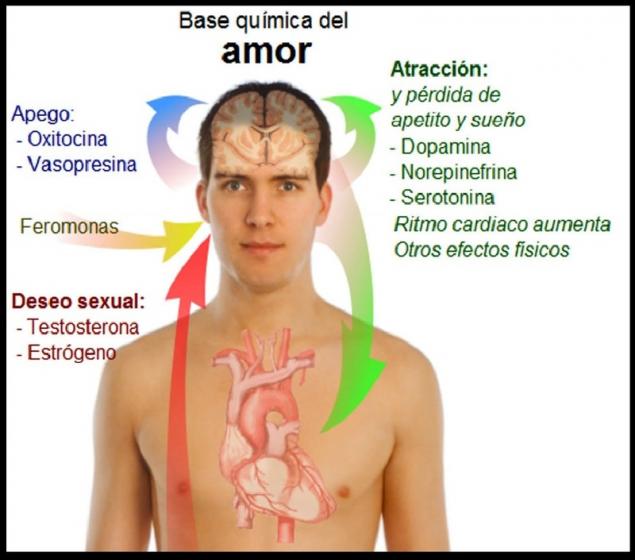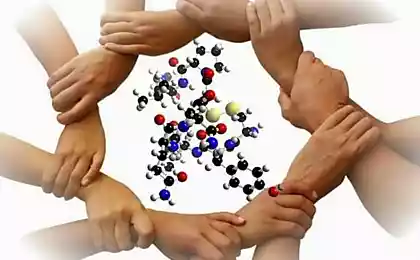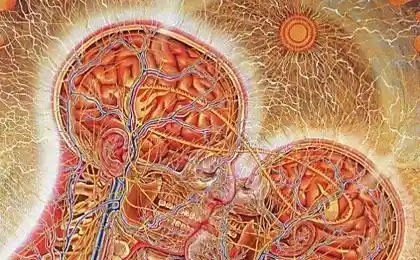558
Chemical component of love
I'm a chemist, engaged in the development of various drugs, such serious things like cancer, aging.
But one day I thought about the chemical component of love. We are studying stress, disease, and what happens in man in love, what chemical processes?

To begin, I wondered: what is love? I used to approach the subject of their research thoroughly. If you are wondering about what, for example, cancer, you will find a clear definition of cancer, a detailed classification of its types.
But when we began to find out what love is, and tried to raise the scientific literature on this topic, I haven't found anything. That is, in science this question at all, no one did. And we had to read philosophers and poets, that though as-that to define this concept.
We all know that the word "love" has many meanings – love can be maternal, brotherly, it can be need, can be a gift. Sometimes love is a pure drug of severe addiction. Passion, tenderness, dependence – different phenomena called love.
The ancient Greeks divided love into types. They identified seven kinds of love, but let's not get too deep, let's consider three: Eros, Philia and Agape.
Eros is the love-passion, that lust, the need to possess someone. Eros is never happy, Yes, lust can be satisfied now, but then it occurs again.
Philia is another type of love, such love is happiness. You are happy when you see another person you like to drink tea with him or to do something together.
Agape is closer to the mercy, love without passion, that sympathy, compassion, the need to help others.

Human behavior depending on the type of love, of course, very different. And if you read poems about love from this point of view, you will see how they are different.
Suppose we are a little undecided with what is called love.
Now decide, what is man? 70 percent of water, 3-4 pounds of bones, everything else is organic, molecules. Man is a big bag of molecules. Everything that happens inside us, has a molecular character.
Life is the interaction of molecules. Many hundreds of years man has studied at the level of bodies. In the early XX century, we have moved to the cell level, and in the last fifty years – at the molecular level.I think need another twenty years to finally understand how the people.
A significant breakthrough in terms of studying emotions, we haveto neuroscientist and pharmacology Thomas Inclu, now Director of the National Institute of mental health USA.
Insel studied the behavior of mice – he was interested in the relationship between mother, father, and mice. He was particularly interested in anxiety in mice, because he was doing drugs to overcome anxiety — anxiolitikami. If he tore the mouse from my mom, the mouse began to squeak and thrash. Insel gave the mouse anxiolytics, and the mouse calmed down. So they mice spent their time.
Once, it was in 2000, Inclu told him some very strange rats, is interesting not typical for rats with monogamy. These rats formed the couple for a lifetime together raising cubs, and was an amazing example of caring about each other. What is particularly interesting, with those same rats have lived with other rats, and they have all been much less romantic – they mated with anyone and especially their offspring did. Good rats lived under the mountain, and bad on the mountain. In this rat belonged to one and the same species, they do not seem to differ.
Insel, of course, very interested in both of those rats began to study them. As he studied them: caught and on the mountain and under the mountain rats, took their tests, I began to explore these analyses in his laboratory. He compared the analyses of good and bad rats, trying to find the difference at the molecular level. But everything was the same.
He struggled for a long time and finally found the difference in the amount of two hormones, vasopressin and oxytocin. In rats with good behavior oxytocin level was high, and the bad rats is low.
Insel went further: he introduced bad rats oxytocin. And what these slutty rats, which was not interested in their offspring, become faithful spouses and good parents. Continuing the experiment, Insel blocked oxytocin in rats good and faithful wife and wonderful parents deteriorated in all respects, they immediately turned into a wanton and indifferent. It turned out that manipulating the number of oxytocin can completely change the behavior of these animals. Maternal love, paternal love, monogamy and polygamy – it turned out that it all depends on some molecules. Only one hormone – and the horrible becomes beautiful and Vice versa. We used to refer to the maternal love as the most sublime things in the world, and what we see: the input molecule – love is, lock the molecule of love is not present.
Vasopressin and oxytocin – it's very simple molecules, small peptides, they are easy to create yourself even in the garage. This is characteristic of all species of living organisms, these hormones invariably found, that is, they are fundamentally important for the evolution. Interestingly, oxytocin explored before – this is the hormone secreted during pregnancy from about the fifth to sixth month, thanks to him, in women there is milk. The woman – as with any mammal in a huge number of secretes this hormone during childbirth. If labor is delayed, doctors use this hormone to speed up childbirth – and as such, it is well studied. About the value of oxytocin for childbirth and breastfeeding has been known for fifty years. But in the last ten years, it became clear that we had underestimated this hormone, and it depends on so much more.
In Israel recently conducted a major study of women who have recently given birth. And as it turned out? Women with high levels of oxytocin had a great relationship with a newborn, complete harmony and understanding. In women with a lack of oxytocin had problems with feeding babies, and mutual understanding; they have all been more nervous and tense.
What happens in this situation with their fathers? If a woman releases oxytocin, both the men watching her empathic infected with this and also begins to develop. If between a man and a woman establishes a close empathic relationship, they together produce oxytocin and be a wonderful caring parents.
We discovered that high levels of oxytocin makes females, fearless – they are not afraid of anything, they are willing to do anything to protect their young. But if oxytocin is not enough, fears much more.Fear of dogs, for example, usually indicates a lack of oxytocin.
Period postpartum depression is accompanied by a sharp drop in the oxytocin – as soon as its level is equalized, the depression goes away. But if his level for some reason is not aligned, depression can take months and even years.
When the baby drinks the mother's milk, he gets along with the milk your dose of oxytocin. And it works on it as ecstasy – is a kind of drug, there is milk to the child very nice. So the babies want to eat as often as possible – the process they're like milk makes them happy. When everything is well, mother feeding produces oxytocin and for themselves, and feeding becomes a pleasure for both.
It's not just fun, but also a key to future harmonious relationships, strong attachment. Ending breastfeeding can be very painful for both mother and child – it can even be like a narcotic withdrawal because they no longer receive the usual dose of oxytocin.
We researched more than five hundred adult men we tried to choose men from generation to generation characterized by loyalty and caring for the children, and men who grew up without fathers and continue the same line with my own children.And we were able to identify the gene that is responsible for stable relationships– faithful men chain of this gene is much longer than the infidels.
In mice, we went further – transplanted mice wrong gen true and achieved amazing results. Mother-mouse who abandoned their newborn babies to their fate, returned to him and started to take care of them, showing miracles of selflessness. With people we have not yet solved so experiment. But in any case, can please those young people who cannot remain faithful to her friends. Now you have an excuse – you can say, "I'm sorry, but it's not my fault, I'm just biologically so constituted".
Of course, genes don't decide everything. Genes give us predisposition – but there are education, tradition, way of life, culture, experience, and all of this will significantly change our personality. And we find people without a genetic predisposition to loyalty, which nevertheless manages to be great spouses and parents.
How to produce oxytocin? Look at the other man fondly, and that person will begin to produce oxytocin. Pat – oxytocin will be more. Kiss it – oxytocin. If you find one with whom you want to associate yourself for a long time, hug and kiss him as often as possible. But be careful with hugs and kisses, if you don't want too much affection and intimacy – produced oxytocin can make far your partner.
During sex and especially orgasm oxytocin is produced in huge quantities and it works on your connection. With the same partner it works a few years – and then, as a rule, gradually disappears. Why? Nature believes that about three years is enough to get a woman pregnant and the baby had to grow up a bit. Say, passion is blind. Yeah, but she's blind six months, a year, a maximum of three years in order for the pair has continued to exist in the future, you need to have something more than a bare drive. Oxytocin is a drug, but for life not enough.

Oxytocin controls not only the relations within the family, but also of relationships in society – if a child is not enough oxytocin, it can not fully communicate with others. He has too many fears, and he becomes autistic. The experiment was carried out – kids with autism were given oxytocin, and they started to look people in the eye. Usually they do not look others in the eye and turn away look to the side.Oxytocin is responsible for trust, sympathy for others.
We conducted an experiment with two groups of students – one was given some oxytocin, the other not, and both groups of unfamiliar people asked to borrow money. 80% of participants in the oxytocin group gave money. In the group without oxytocin, the money did not want to give any one person. That is, oxytocin helps to establish between people relationships. Without him, love our neighbors and the more distant, it becomes much more difficult. Were investigated, the volunteers of charity organizations is predictably revealed that they have with oxytocin is all right.
Of course, culture and upbringing are extremely important. But it is impossible not to take into account the molecular mechanisms of the person, his genetic predisposition. I guess if you live in the mountains in Switzerland, a chronic lack of oxytocin and result in anxiety and depression. But if the circumstances of your life have to make often very nervous, – if you, God forbid, lose a loved one, or get in an accident, your predisposition can play a bad role.
The question arises if these molecular studies to cause harm, whether or not they continue? What happens if we get the ability to control love? This idea seems dangerous, so we come to the invention of the love potion. Yes, it is extremely useful to work on drugs that reduce anxiety, but how to avoid unauthorized manipulation over people? But it's the eternal question.Man tamed fire, because fire is warm. But the fire is careless handling – fire.
Author: Marcel Iber
P. S. And remember, just changing your mind — together we change the world! ©
Source: psychojournal.ru/article/254-himiya-lyubvi.html
But one day I thought about the chemical component of love. We are studying stress, disease, and what happens in man in love, what chemical processes?

To begin, I wondered: what is love? I used to approach the subject of their research thoroughly. If you are wondering about what, for example, cancer, you will find a clear definition of cancer, a detailed classification of its types.
But when we began to find out what love is, and tried to raise the scientific literature on this topic, I haven't found anything. That is, in science this question at all, no one did. And we had to read philosophers and poets, that though as-that to define this concept.
We all know that the word "love" has many meanings – love can be maternal, brotherly, it can be need, can be a gift. Sometimes love is a pure drug of severe addiction. Passion, tenderness, dependence – different phenomena called love.
The ancient Greeks divided love into types. They identified seven kinds of love, but let's not get too deep, let's consider three: Eros, Philia and Agape.
Eros is the love-passion, that lust, the need to possess someone. Eros is never happy, Yes, lust can be satisfied now, but then it occurs again.
Philia is another type of love, such love is happiness. You are happy when you see another person you like to drink tea with him or to do something together.
Agape is closer to the mercy, love without passion, that sympathy, compassion, the need to help others.

Human behavior depending on the type of love, of course, very different. And if you read poems about love from this point of view, you will see how they are different.
Suppose we are a little undecided with what is called love.
Now decide, what is man? 70 percent of water, 3-4 pounds of bones, everything else is organic, molecules. Man is a big bag of molecules. Everything that happens inside us, has a molecular character.
Life is the interaction of molecules. Many hundreds of years man has studied at the level of bodies. In the early XX century, we have moved to the cell level, and in the last fifty years – at the molecular level.I think need another twenty years to finally understand how the people.
A significant breakthrough in terms of studying emotions, we haveto neuroscientist and pharmacology Thomas Inclu, now Director of the National Institute of mental health USA.
Insel studied the behavior of mice – he was interested in the relationship between mother, father, and mice. He was particularly interested in anxiety in mice, because he was doing drugs to overcome anxiety — anxiolitikami. If he tore the mouse from my mom, the mouse began to squeak and thrash. Insel gave the mouse anxiolytics, and the mouse calmed down. So they mice spent their time.
Once, it was in 2000, Inclu told him some very strange rats, is interesting not typical for rats with monogamy. These rats formed the couple for a lifetime together raising cubs, and was an amazing example of caring about each other. What is particularly interesting, with those same rats have lived with other rats, and they have all been much less romantic – they mated with anyone and especially their offspring did. Good rats lived under the mountain, and bad on the mountain. In this rat belonged to one and the same species, they do not seem to differ.
Insel, of course, very interested in both of those rats began to study them. As he studied them: caught and on the mountain and under the mountain rats, took their tests, I began to explore these analyses in his laboratory. He compared the analyses of good and bad rats, trying to find the difference at the molecular level. But everything was the same.
He struggled for a long time and finally found the difference in the amount of two hormones, vasopressin and oxytocin. In rats with good behavior oxytocin level was high, and the bad rats is low.
Insel went further: he introduced bad rats oxytocin. And what these slutty rats, which was not interested in their offspring, become faithful spouses and good parents. Continuing the experiment, Insel blocked oxytocin in rats good and faithful wife and wonderful parents deteriorated in all respects, they immediately turned into a wanton and indifferent. It turned out that manipulating the number of oxytocin can completely change the behavior of these animals. Maternal love, paternal love, monogamy and polygamy – it turned out that it all depends on some molecules. Only one hormone – and the horrible becomes beautiful and Vice versa. We used to refer to the maternal love as the most sublime things in the world, and what we see: the input molecule – love is, lock the molecule of love is not present.
Vasopressin and oxytocin – it's very simple molecules, small peptides, they are easy to create yourself even in the garage. This is characteristic of all species of living organisms, these hormones invariably found, that is, they are fundamentally important for the evolution. Interestingly, oxytocin explored before – this is the hormone secreted during pregnancy from about the fifth to sixth month, thanks to him, in women there is milk. The woman – as with any mammal in a huge number of secretes this hormone during childbirth. If labor is delayed, doctors use this hormone to speed up childbirth – and as such, it is well studied. About the value of oxytocin for childbirth and breastfeeding has been known for fifty years. But in the last ten years, it became clear that we had underestimated this hormone, and it depends on so much more.
In Israel recently conducted a major study of women who have recently given birth. And as it turned out? Women with high levels of oxytocin had a great relationship with a newborn, complete harmony and understanding. In women with a lack of oxytocin had problems with feeding babies, and mutual understanding; they have all been more nervous and tense.
What happens in this situation with their fathers? If a woman releases oxytocin, both the men watching her empathic infected with this and also begins to develop. If between a man and a woman establishes a close empathic relationship, they together produce oxytocin and be a wonderful caring parents.
We discovered that high levels of oxytocin makes females, fearless – they are not afraid of anything, they are willing to do anything to protect their young. But if oxytocin is not enough, fears much more.Fear of dogs, for example, usually indicates a lack of oxytocin.
Period postpartum depression is accompanied by a sharp drop in the oxytocin – as soon as its level is equalized, the depression goes away. But if his level for some reason is not aligned, depression can take months and even years.
When the baby drinks the mother's milk, he gets along with the milk your dose of oxytocin. And it works on it as ecstasy – is a kind of drug, there is milk to the child very nice. So the babies want to eat as often as possible – the process they're like milk makes them happy. When everything is well, mother feeding produces oxytocin and for themselves, and feeding becomes a pleasure for both.
It's not just fun, but also a key to future harmonious relationships, strong attachment. Ending breastfeeding can be very painful for both mother and child – it can even be like a narcotic withdrawal because they no longer receive the usual dose of oxytocin.
We researched more than five hundred adult men we tried to choose men from generation to generation characterized by loyalty and caring for the children, and men who grew up without fathers and continue the same line with my own children.And we were able to identify the gene that is responsible for stable relationships– faithful men chain of this gene is much longer than the infidels.
In mice, we went further – transplanted mice wrong gen true and achieved amazing results. Mother-mouse who abandoned their newborn babies to their fate, returned to him and started to take care of them, showing miracles of selflessness. With people we have not yet solved so experiment. But in any case, can please those young people who cannot remain faithful to her friends. Now you have an excuse – you can say, "I'm sorry, but it's not my fault, I'm just biologically so constituted".
Of course, genes don't decide everything. Genes give us predisposition – but there are education, tradition, way of life, culture, experience, and all of this will significantly change our personality. And we find people without a genetic predisposition to loyalty, which nevertheless manages to be great spouses and parents.
How to produce oxytocin? Look at the other man fondly, and that person will begin to produce oxytocin. Pat – oxytocin will be more. Kiss it – oxytocin. If you find one with whom you want to associate yourself for a long time, hug and kiss him as often as possible. But be careful with hugs and kisses, if you don't want too much affection and intimacy – produced oxytocin can make far your partner.
During sex and especially orgasm oxytocin is produced in huge quantities and it works on your connection. With the same partner it works a few years – and then, as a rule, gradually disappears. Why? Nature believes that about three years is enough to get a woman pregnant and the baby had to grow up a bit. Say, passion is blind. Yeah, but she's blind six months, a year, a maximum of three years in order for the pair has continued to exist in the future, you need to have something more than a bare drive. Oxytocin is a drug, but for life not enough.

Oxytocin controls not only the relations within the family, but also of relationships in society – if a child is not enough oxytocin, it can not fully communicate with others. He has too many fears, and he becomes autistic. The experiment was carried out – kids with autism were given oxytocin, and they started to look people in the eye. Usually they do not look others in the eye and turn away look to the side.Oxytocin is responsible for trust, sympathy for others.
We conducted an experiment with two groups of students – one was given some oxytocin, the other not, and both groups of unfamiliar people asked to borrow money. 80% of participants in the oxytocin group gave money. In the group without oxytocin, the money did not want to give any one person. That is, oxytocin helps to establish between people relationships. Without him, love our neighbors and the more distant, it becomes much more difficult. Were investigated, the volunteers of charity organizations is predictably revealed that they have with oxytocin is all right.
Of course, culture and upbringing are extremely important. But it is impossible not to take into account the molecular mechanisms of the person, his genetic predisposition. I guess if you live in the mountains in Switzerland, a chronic lack of oxytocin and result in anxiety and depression. But if the circumstances of your life have to make often very nervous, – if you, God forbid, lose a loved one, or get in an accident, your predisposition can play a bad role.
The question arises if these molecular studies to cause harm, whether or not they continue? What happens if we get the ability to control love? This idea seems dangerous, so we come to the invention of the love potion. Yes, it is extremely useful to work on drugs that reduce anxiety, but how to avoid unauthorized manipulation over people? But it's the eternal question.Man tamed fire, because fire is warm. But the fire is careless handling – fire.
Author: Marcel Iber
P. S. And remember, just changing your mind — together we change the world! ©
Source: psychojournal.ru/article/254-himiya-lyubvi.html
Genogram: the laws by which lives and develops in your FAMILY
Referred pain: IMPORTANT to know about trigger points























